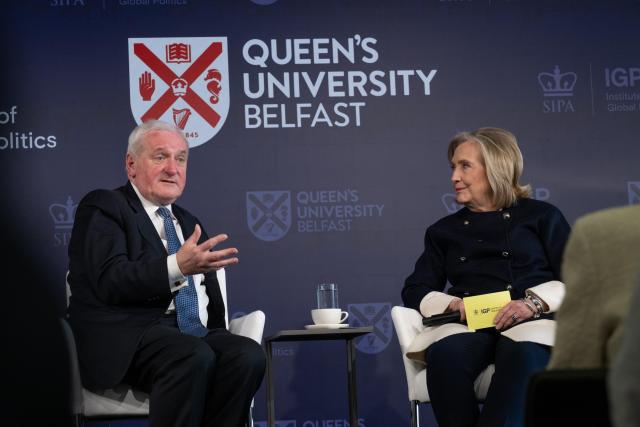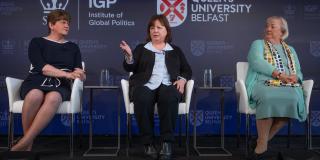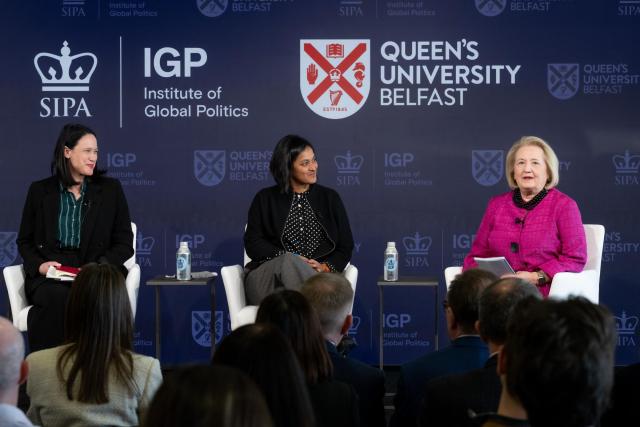
On Women’s Integral Role in Peace Processes Worldwide

“The evidence is clear that when women are involved in peace negotiations, the agreements are more durable, they are more inclusive, and less likely to break down,” said Dean Keren Yarhi-Milo of SIPA. “The Good Friday Agreement is proof of what's possible when women are included at the negotiating table.”
Yarhi-Milo’s remarks came at the opening of a March 19 event, hosted by the Institute of Global Politics (IGP) in partnership with Queen’s University Belfast, that examined the integral role of women in peace processes around the world.
In particular, women had played a critical part in the Northern Ireland peace process and negotiations that led to the Good Friday Agreement of 1998. That landmark peace deal ended three decades of conflict between British Protestant unionists and Irish Catholic nationalists in Northern Ireland — a period known as “the Troubles,” during which nearly 3,600 people were killed.

Former Secretary of State Hillary Rodham Clinton, who chairs IGP’s Faculty Advisory Board and serves as chancellor of Queen’s University Belfast, said in her opening remarks that women’s contributions to peace processes have often gone unrecognized far too often. “For many years, women's roles in the great events of the world have been overlooked, erased from history books, or, literally, never put in, in the first place,” Cllinton said.
The event featured three panels, the first of which spotlighted women involved in negotiating the Good Friday Agreement, including two of the founding members of the Northern Ireland Women’s Coalition (NIWC). Formed in 1996 to give Northern Irish women a seat at the negotiating table, the NIWC was a cross-community political party that brought together Protestant and Catholic women and promoted values of equality, inclusion, and human rights. The group successfully inserted issues including victims’ rights, integrated education, mixed housing, and reconciliation into the Agreement, as well as a clause affirming “the right of women to full and equal political participation.”
Monica McWilliams, former Northern Ireland Human Rights Commissioner and cofounder of NIWC, discussed her experience as one of just two women at the table during the multiparty peace talks. The fighting between opposing sides in the room, she said, was a “very toxic, very difficult environment.” She also spoke about the necessity of listening to other perspectives during the negotiations, and recalled how nearly every person in the room had lost someone in the conflict — herself included; her former boyfriend was killed in 1974.
“You don't get to pick your negotiating partners,” said McWilliams. “You negotiate with people who killed your loved ones. And that's what we did.”
Everyone has their point of view, and I think the important thing is to listen to the point of view — no matter how off the wall it might seem.
— Bertie Ahern, Ireland's former prime minister
The second panel focused on global perspectives on women in peacebuilding. Miriam Coronel-Ferrer discussed her work as lead negotiator for the Philippine government on the Bangsamoro agreement and the influence of Northern Ireland’s case on the peace deal. Coronel-Ferrer, who was the world’s first female chief negotiator to sign a major peace accord, spoke about the importance of engaging civil society and including provisions in the Bangsamoro to protect women’s rights to political participation, just as the Good Friday Agreement did. According to recent data on agreements signed each year, she said that “on average only 20 to 30 percent of them actually have provisions on women.”
Phoebe Donnelly, a SIPA assistant adjunct professor who also leads the Women, Peace, and Security Program at the International Peace Institute, emphasized that more progress is needed to increase women’s participation in peace and security processes globally. According to data from UN Women, women represented just 6 percent of mediators, 6 percent of signatories, and 13 percent of negotiators in peace processes tracked from 1992 to 2019. The safety risks women face pose another obstacle to their participation, Donnelly explained.

In the final panel Secretary Clinton sat down with Bertie Ahern — who as Ireland’s Taoiseach, or prime minister, from 1997 to 2008 was a cosignatory of the Good Friday Agreement — to discuss his role in bringing the conflict to an end. Ahern echoed the comments of earlier panelists who stressed the necessity of listening to other perspectives and points of view and getting to know all the parties involved. “I made a point of listening to them all,” he said. “You know, everyone has their point of view, and I think the important thing is to listen to the point of view — no matter how off the wall” it might seem to you.
On the thorniest issues — police reform, criminal justice reform, prisoners — Ahern said he didn’t seek comprehensive agreement. Instead, he said, he would try to find a single item people could agree on to establish some common ground.
At the end of the panel, Maebh Reynolds, a young tech entrepreneur from West Belfast and alumna of Queen’s, joined the conversation to talk about the impact the Agreement has had on her life and opportunities growing up in Northern Ireland compared to her parents’ generation. Born a year after the Agreement was signed, she called the difference in her upbringing and her father's upbringing in West Belfast “absolute night and day.”
The event was preceded by a screening of the BBC documentary, The Agreement, which chronicles the negotiations leading to the Good Friday accord.